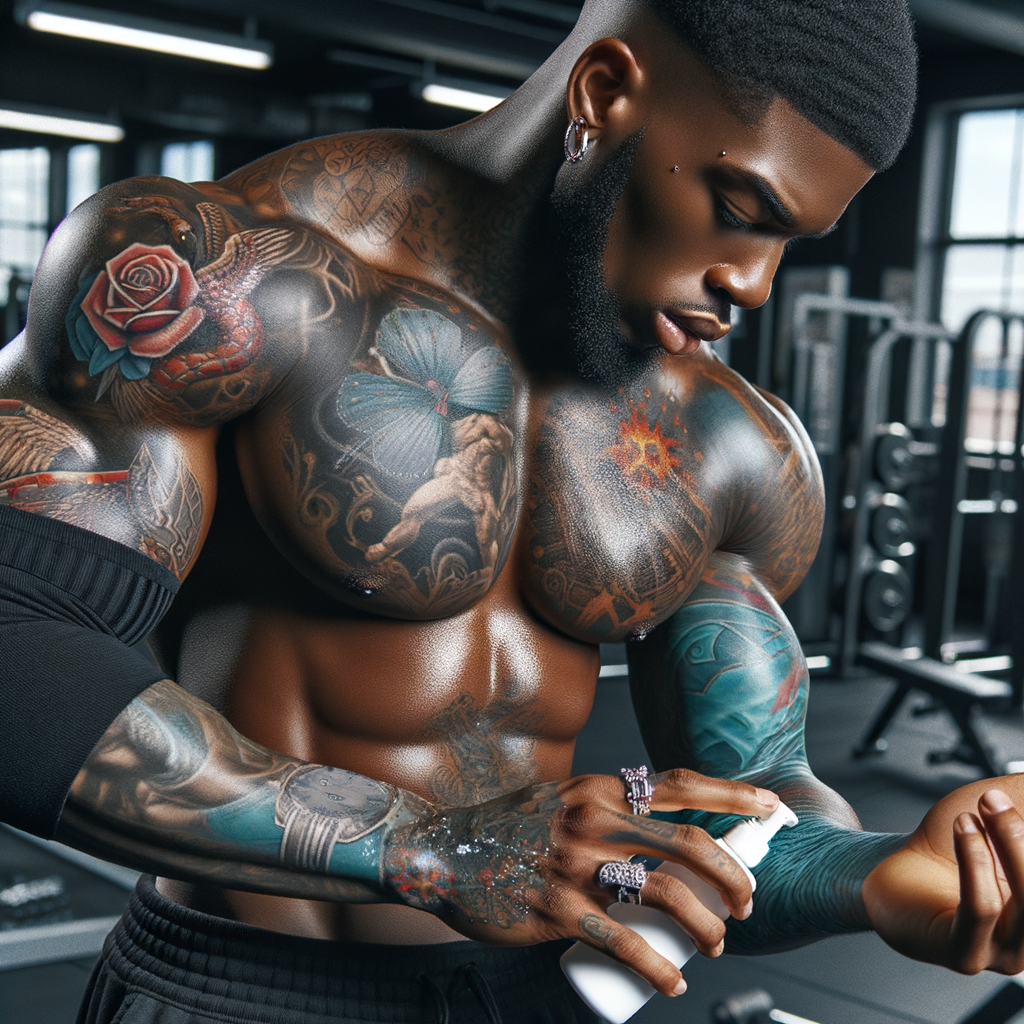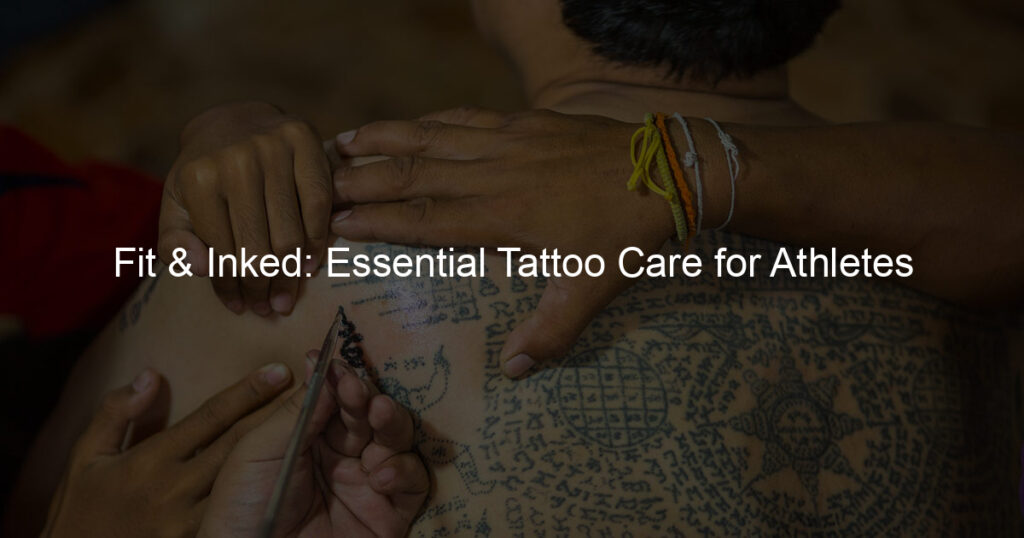
Introduction: Fitness and Tattoos
Welcome to our comprehensive guide on fitness and tattoos. In this post, we will delve into the rising trend of tattoos among athletes and the importance of tattoo care for athletes. We aim to provide clear and informative content that will help athletes maintain their tattoos while keeping up with their fitness routines.
Over the years, tattoos have become increasingly popular among athletes. From basketball players to swimmers, gymnasts to runners, it’s not uncommon to see athletes sporting intricate tattoo designs. Tattoos have become a way for athletes to express their personal style, commemorate significant events, or symbolize their dedication to their sport.
According to a recent survey, approximately 30% of athletes have at least one tattoo. This trend is not limited to any particular sport or country. It is a global phenomenon that cuts across all sports and nationalities. The reasons for getting a tattoo vary from athlete to athlete. Some get inked to mark a significant achievement, while others do it for aesthetic reasons. Regardless of the reason, one thing is clear – tattoos are here to stay in the world of sports.
While tattoos can be a beautiful form of self-expression, they also require proper care, especially for athletes. The physical strain that athletes put their bodies through can affect the healing process of a new tattoo and the appearance of an existing one.
Proper tattoo aftercare is crucial for athletes for several reasons. Firstly, a fresh tattoo is an open wound and is susceptible to infection. Athletes are often exposed to sweat, dirt, and bacteria, which can lead to infection if a new tattoo is not properly cared for. Secondly, the constant movement and stretching of the skin can cause a new tattoo to fade or distort if not properly protected and moisturized.
Furthermore, exposure to sunlight and chlorinated water can also affect a tattoo’s appearance. Therefore, athletes with tattoos need to take extra precautions to protect their skin and maintain the vibrancy of their tattoos.
Tattoo Aftercare for Athletes
As an athlete, getting a new tattoo requires special attention. It’s crucial to understand how to care for your new ink, especially during the initial healing process. Let’s delve into the details.
Initial Tattoo Healing and Exercise
The first few days after getting a tattoo are crucial for its healing. During this time, your body is working hard to repair the skin and protect the new ink. Let’s break down this process and its relationship with exercise.
-
- Understanding the tattoo healing process
Your body starts healing immediately after getting a tattoo. The skin around the tattooed area may be red and swollen. This is a normal response as your body starts repairing the skin. After a few days, the skin will start to peel, revealing the new ink underneath. This process can take up to two weeks.
-
- Impact of exercise on fresh tattoos
Exercise can have both positive and negative impacts on a fresh tattoo. On the one hand, exercise promotes blood circulation, which can aid in the healing process. On the other hand, excessive sweating and friction from clothing can irritate the tattooed area and slow down healing. Therefore, it’s important to strike a balance.
-
- Recommended exercise restrictions after getting a tattoo
It’s recommended to avoid strenuous exercise for the first 48 hours after getting a tattoo. This allows your body to focus on healing the tattooed area. After this period, light exercise is generally okay, but avoid exercises that cause excessive sweating or friction on the tattoo. For example, if you have a tattoo on your arm, avoid weightlifting until the tattoo has fully healed.
Remember, every person’s body is different, and so is their healing process. Always listen to your body and consult with your tattoo artist if you have any concerns.
Essential Tattoo Care Tips for Athletes
As an athlete, taking care of your tattoo is just as important as your training routine. Here are some essential tips to help you maintain your tattoo while staying active:
-
- Keeping the Tattoo Clean During Workouts
When you’re working up a sweat, it’s crucial to keep your tattoo clean. Sweat contains salt and other substances that can irritate a fresh tattoo. After your workout, gently wash your tattoo with warm water and mild soap. Pat it dry with a clean towel and apply a thin layer of tattoo aftercare ointment. This routine will help prevent infection and keep your tattoo looking vibrant.
-
- Proper Hydration and Its Impact on Tattoo Healing
Hydration plays a key role in tattoo healing. Drinking plenty of water helps your skin stay healthy and speeds up the healing process. A well-hydrated body can also better handle the stress of a new tattoo. Aim for at least 8 glasses of water a day, especially on days when you’re exercising.
-
- Importance of High-Quality Tattoo Aftercare Products
Investing in high-quality tattoo aftercare products is essential for athletes. These products are designed to protect your tattoo from damage and promote faster healing. Look for products that are hypoallergenic, free from harsh chemicals, and specifically formulated for tattoo care. Remember, a well-cared-for tattoo will retain its color and clarity much longer.
In conclusion, taking care of your tattoo as an athlete involves keeping it clean, staying hydrated, and using the right aftercare products. By following these tips, you can ensure your tattoo heals properly and looks great for years to come.
Maintaining Tattoos in Fitness
As a fitness enthusiast with a tattoo, you may wonder how to maintain your ink while keeping up with your workout routine. This section will provide you with essential tips and insights.
Tattoo Maintenance for Fitness Enthusiasts
Here are some key points to consider when it comes to tattoo maintenance for fitness enthusiasts:
-
- Long-term tattoo care tips for athletes
Long-term tattoo care is crucial for athletes. Here are some tips:
-
-
- Keep it clean: Always clean your tattoo with mild soap and warm water, especially after a workout to avoid infection.
- Moisturize: Keep your tattoo moisturized with a tattoo-specific lotion. It helps in maintaining the vibrancy of your tattoo.
- Protect from sun: Sun exposure can fade your tattoo. Always apply a high SPF sunscreen on your tattoo before heading outdoors.
- Stay hydrated: Drinking plenty of water helps in maintaining the health of your skin and the appearance of your tattoo.
- Impact of fitness on tattoos: Case studies
-
Several case studies have shown that fitness can have both positive and negative impacts on tattoos. Let’s look at some examples:
| Case Study | Impact on Tattoo |
|---|---|
| Weightlifting Athlete | Excessive muscle growth can stretch the skin and distort the tattoo. |
| Marathon Runner | Constant friction from clothing can cause tattoo fading. |
| Swimmer | Chlorine in swimming pools can cause tattoo discoloration. |
These case studies show that while fitness is essential for overall health, it’s equally important to take care of your tattoo during your fitness journey.
Exercise After Getting a Tattoo
After getting a new tattoo, it’s crucial to adjust your exercise routine to protect your new artwork. Here, we will discuss safe exercises for newly tattooed athletes and how to return to your regular workout routine post-tattoo.
-
- Safe exercises for newly tattooed athletes
When you have a fresh tattoo, it’s best to avoid strenuous exercises that can cause excessive sweating or stretch the tattooed skin. This is because sweat contains salt, which can irritate the tattoo and delay healing. Also, stretching can cause the tattoo to warp or fade.
Safe exercises include walking, light jogging, and yoga. These activities promote blood circulation, which can aid in the healing process, without causing too much sweat or stretching. It’s also recommended to wear loose, breathable clothing during these exercises to avoid friction on the tattooed area.
-
- Returning to regular workout routine post-tattoo
Once your tattoo has fully healed, you can gradually return to your regular workout routine. This typically takes about 2-3 weeks, but it can vary depending on the size and location of your tattoo, and your body’s healing rate.
Start by reintroducing moderate exercises into your routine, such as cycling or swimming. Monitor your tattoo for any signs of irritation or discomfort. If there are none, you can gradually increase the intensity of your workouts until you’re back to your regular routine.
Remember, even after your tattoo has healed, it’s important to protect it from sun damage and chafing. Always apply a high-SPF sunscreen on your tattoo before exercising outdoors, and wear protective clothing if necessary.
In conclusion, exercising after getting a tattoo requires some adjustments to your routine, but with proper care and attention, you can maintain your fitness level without compromising your new artwork.
Tattoos and Athletic Performance
One of the most debated topics in the fitness community is the impact of tattoos on athletic performance. There are several myths and misconceptions surrounding this topic. In this section, we will delve into the question: Does having a tattoo affect athletic performance?
Does Having a Tattoo Affect Athletic Performance?
There are two main areas of concern when it comes to tattoos and athletic performance: the effect of tattoos on sweat rate and the overall impact of tattoos on performance. Let’s explore these areas in detail.
-
- Exploring the myth: Tattoos and reduced sweat rate
One of the most common myths about tattoos is that they can reduce sweat rate, which could potentially affect an athlete’s performance. The theory is that the ink in tattoos can block sweat glands, reducing the body’s ability to cool itself down during intense physical activity.
However, a study conducted by the American Journal of Human Biology found that there was no significant difference in sweat rate between tattooed and non-tattooed skin. This suggests that having a tattoo does not necessarily affect an athlete’s ability to sweat and cool down.
-
- Research on tattoos and athletic performance
While there is limited research on the direct impact of tattoos on athletic performance, existing studies suggest that tattoos do not have a significant effect on an athlete’s ability to perform.
For example, a study published in the Journal of Strength and Conditioning Research found that tattoos did not affect the muscle strength or endurance of the participants. This suggests that having a tattoo does not necessarily hinder an athlete’s performance.
In conclusion, while there are many myths surrounding tattoos and athletic performance, current research suggests that having a tattoo does not significantly affect an athlete’s ability to perform. However, more research is needed to fully understand the potential impacts of tattoos on athletic performance.
Tattoos and Gym Workouts
When it comes to tattoos and gym workouts, there are a couple of important factors to consider. These include the impact of the gym environment on tattoo healing and how to prevent tattoo damage during gym workouts.
-
- Impact of Gym Environment on Tattoo Healing
Firstly, let’s talk about the gym environment. Gyms are known for their high levels of bacteria due to the number of people using the equipment and the sweat left behind. This can pose a threat to a new tattoo, which is essentially an open wound. Bacteria can cause infections and delay the healing process. Therefore, it’s crucial to keep your new tattoo clean and covered when you’re at the gym.
-
- Preventing Tattoo Damage During Gym Workouts
Secondly, preventing tattoo damage during gym workouts is another key concern. The friction caused by gym equipment can damage a new tattoo. For instance, if you have a tattoo on your back, doing exercises that require you to lie on your back can cause irritation. To prevent this, try to avoid exercises that put pressure on your new tattoo until it’s fully healed. Also, wearing breathable and soft clothing can help to minimize friction.
In conclusion, while it’s possible to continue your gym workouts with a new tattoo, it’s important to take extra precautions. This will ensure that your tattoo heals properly and maintains its vibrant colors and sharp lines. Remember, a tattoo is a long-term investment in your body, so it’s worth taking the time to care for it properly.
Conclusion: Balancing Fitness and Tattoo Care
As we reach the end of our discussion, it’s clear that the balance between maintaining a fitness routine and caring for a tattoo is a delicate one. However, with the right knowledge and practices, it’s entirely possible to do both successfully. Let’s recap the key takeaways and share some final thoughts on this topic.
-
- Key takeaways on tattoo care for athletes
Firstly, it’s crucial to understand that a fresh tattoo is essentially an open wound. This means it needs time to heal and should be kept clean and moisturized. Athletes should avoid intense workouts for at least 48 hours after getting a tattoo. Sweat can interfere with the healing process, so it’s best to keep the tattoo dry and clean.
Secondly, protecting your tattoo from the sun is vital. UV rays can fade the tattoo ink, so always apply a high SPF sunscreen on your tattoo before heading outdoors.
Lastly, remember to stay hydrated. Drinking plenty of water helps your skin stay healthy and aids in the tattoo healing process.
-
- Final thoughts on maintaining tattoos in fitness
While tattoos and fitness might seem like an unlikely pair, they can coexist harmoniously with the right care. The key is to be mindful of the healing process and adjust your workout routine accordingly. Don’t rush back into intense workouts and risk damaging your new tattoo.
Remember, a tattoo is a lifelong commitment, just like your commitment to fitness. Both require patience, dedication, and care. So, take the time to care for your tattoo properly, and it will remain a vibrant and meaningful part of your fitness journey for years to come.
In conclusion, balancing fitness and tattoo care doesn’t have to be a daunting task. With the right information and a little bit of planning, you can continue to train hard and show off your new ink with pride.














